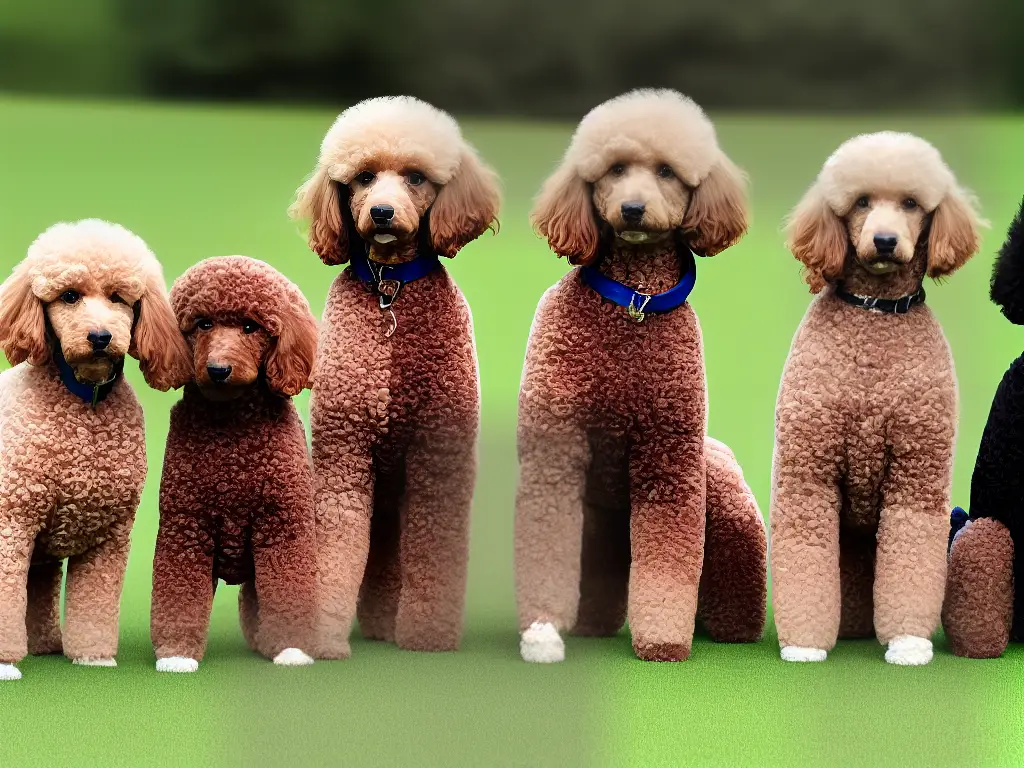Poodle Mixes: Understanding Their Behavior and Temperament
Graceful, intelligent, and affectionate, poodles have captured the hearts of dog enthusiasts across the globe. However, when mixed with other breeds, poodle mixes have gained their own unique popularity, sparking intrigue and curiosity among potential dog owners. This informative exploration delves into the world of poodle mixes, uncovering their traits, temperament, health, and care, as well as providing insights on adoption and debunking common myths surrounding these adorable canines.
Poodle Breed Overview
Poodles are a breed of dog that originated in Germany but gained immense popularity in France, where they became the national breed. They come in three sizes: standard, miniature, and toy. Poodles are highly intelligent, energetic, and versatile dogs that excel in various dog sports and activities. Their unique coat, which is curly and dense, is hypoallergenic, making them a popular choice for those with pet allergies.
One of the most significant aspects of poodle mixes is their temperament. Poodles are known for being intelligent, friendly, and highly trainable. These traits often carry on to their mixed offspring, making them sought after by enthusiasts and hobbyists alike. Poodle mixes can retain some of the poodle’s energetic and playful nature, which some may perceive as craziness. However, this behavior generally reflects the dog’s excitement and need for mental and physical stimulation.
The popularity of poodle mixes, often referred to as “Doodle” breeds, has skyrocketed in recent years. This is due to their endearing personalities, low-shedding coats, and adaptability to various lifestyles. Some popular poodle mixes include the Labradoodle (Labrador Retriever and Poodle) and the Goldendoodle (Golden Retriever and Poodle). These breeds inherit traits from both of their parent breeds, making for well-rounded, lovable pets. While every dog is an individual, the combination of breeds can contribute to the perception of craziness in poodle mixes.
As with any breed, proper training, exercise, and socialization can have a significant impact on a poodle mix’s temperament. Ensuring that these dogs receive adequate mental and physical stimulation can help to manage their innate energy levels. Engaging in activities like obedience training, dog sports, and regular walks can contribute to a well-behaved and balanced poodle mix. Positive reinforcement training techniques can also be employed to manage “crazy” behaviors that may arise.
Another factor that may contribute to the perception of craziness in poodle mixes, commonly known as “Doodle” breeds, is their instinctive nature. Poodles were initially bred as water retrievers and have a strong instinct for retrieving. This natural instinct, combined with their energetic and intelligent personalities, can lead to behaviors that some may view as crazy, such as incessantly chasing toys or other objects.

Understanding Poodle Mixes
Understanding and managing this instinct through appropriate outlets and training can help poodle mixes to thrive as beloved companion animals. Doodle breeds have become increasingly popular due to their unique blend of traits from both poodles and their respective mix breeds, adding even more reasons for enthusiasts and hobbyists to become skilled in handling these fascinating dogs.
Some of the most sought-after poodle mixes include Labradoodles (Labrador Retriever and Poodle mix), Goldendoodles (Golden Retriever and Poodle mix), and Cockapoos (Cocker Spaniel and Poodle mix).
The hypoallergenic coat of poodles is a significant factor in why people choose poodle mixes. Poodles have a unique curly coat that is less likely to shed and cause allergies compared to other breeds. Mixed doodle breeds typically inherit the hypoallergenic trait from their poodle parent, making them ideal companions for pet allergy sufferers.
Poodles are renowned for their intelligence, which means that their mixed offspring often inherit this trait. This results in highly trainable poodle mixes that can learn tasks and commands quickly, making them excellent service or therapy dogs that are adaptable to the needs of their owners.
Poodle mixes also have friendly, sociable, and affectionate personalities that make them excellent family pets. They get along well with children, other pets, and strangers, thriving in social environments. They bond closely with their human family members and are loyal, loving pets that enjoy human interaction and attention.
Poodle mixes, commonly known as “doodle” breeds, have gained popularity in recent years due to their hypoallergenic coats and diverse range of temperaments. These mixed breeds come in a variety of shapes, sizes, and colors and are a combination of a poodle with another breed. When it comes to temperament, poodle mixes can inherit a wide range of traits from both parent breeds, which can lead to a variety of behavioral traits and energy levels.

Poodle Mix Temperament
As a quite energetic and intelligent hybrid, poodle mixes require regular exercise and mental stimulation to stay happy and healthy. Providing regular exercise and stimulation can prevent behavioral issues that may arise from boredom or lack of activity. Engaging in obedience training, food puzzle toys, or interactive play can provide mental stimulation, resulting in a happy and healthy companion that brings joy to their family for years to come.
One factor that may contribute to the temperament of a poodle mix is its intelligence. Poodles are known for their high level of intelligence and problem-solving abilities, which can make them easy to train and quick to learn. This inherited trait in poodle mixes means they may also be quick to pick up on both good behaviors and bad, so consistent training and socialization are crucial to ensure proper behavior. Additionally, if not kept mentally stimulated, these intelligent dogs could become bored or anxious, leading to destructive or unwanted behaviors.
Sociability is another factor that can affect the temperament of poodle mixes. Both poodles and many other breeds used in these mixes tend to be social animals that thrive in the company of humans and other dogs. For instance, the Goldendoodle (a mix between a Golden Retriever and a Poodle) tends to be friendly, outgoing, and people-oriented. However, there might be certain exceptions depending on the other breed involved in the mix; some parent breeds may be more independent or reserved, leading to a poodle mix that may also exhibit these traits.
Energy levels are yet another aspect that can contribute to a poodle mix’s temperament. Poodles are known for their high energy levels, particularly the Standard and Miniature Poodles. Combining a poodle with a high-energy breed, such as a Labrador Retriever or a Border Collie, may result in an offspring that requires ample amounts of exercise and mental stimulation. On the other hand, some poodle mixes, like the Maltipoo (a mix between a Maltese and a Poodle), tend to inherit a more laid-back and calmer nature.
It’s essential to remember that the temperament of poodle mixes, also known as “doodle” breeds, will be strongly influenced by their genetic background and upbringing. Proper socialization and training should not be overlooked, as poodle mixes have the potential to be great companions, with friendly and sociable personalities. Nevertheless, potential owners should be aware that some may inherit traits from their parent breeds that call for specific care and attention. Thorough research on the specific poodle mix breed and its parent breeds can help to provide a better understanding of how their temperament and behavior may differ.

Poodle Mix Health and Care
When it comes to the general health of poodle mixes, these dogs may benefit from hybrid vigor, meaning they could be less prone to the genetic health issues that are common in their purebred parent breeds. However, it is essential to keep in mind that any dog, regardless of breed or mix, may inherit health issues from their parents or develop them over time. As a result, it is crucial to provide regular veterinary care and maintain a healthy lifestyle for your Poodle mix. Ensuring they receive the proper care and attention helps them live a happy and healthy life, making them an excellent companion for enthusiasts and hobbyists alike.
Grooming plays a significant role in maintaining the health and wellbeing of a Poodle mix. Many Poodle crosses inherit the curly, low-shedding coat of their Poodle parent, which requires regular brushing and grooming to prevent matting and tangles. Depending on the specific mix, grooming may need to be done as often as every few days for some breeds or weekly for others. It is crucial to keep the ears clean and dry, as well, as breeds with floppy ears, like Poodles and many of their mixed breeds, may be more prone to ear infections. Regularly brushing their teeth, trimming their nails, and maintaining a clean living environment will also help keep your Poodle mix in the best possible health.
Exercise is another important factor in keeping your Poodle mix healthy. Both physical and mental stimulation is necessary to ensure they do not become bored, anxious, or destructive. Poodles are known for their intelligence, and their mixed-breed offspring may be equally as quick-witted. Providing your Poodle mix with daily walks, playtime, and obedience or puzzle games will keep their bodies strong and their minds sharp.
Feeding your Poodle mix a well-balanced diet is essential to maintaining their overall health. Be sure to choose a high-quality dog food that meets their specific nutritional needs, which may vary based on their age, size, and activity level. Consult with your veterinarian about the best food options, and consider offering supplements if needed. Be mindful of the amount of food you provide, as overweight dogs may experience a range of health problems, including joint issues and heart disease.
In summary, the health and wellbeing of a Poodle mix require regular grooming, daily exercise, and feeding a balanced diet. By being attentive to these factors and staying informed about your specific mixed breed’s health, you can help ensure that they lead a long and happy life. Be an advocate for their health by staying educated about any potential inheritable conditions and scheduling regular check-ups with your veterinarian to address any concerns promptly.

Training and Socialization
Along with ensuring their physical health, it is crucial to focus on the training and socialization of your Poodle mix. Poodle mixes, like all dogs, require consistent and structured guidance to develop into well-behaved and socially confident pets. While it’s true that poodle mixes can have a reputation for being high-energy and even “crazy,” this is often due more to a lack of appropriate training than any inherent characteristic of the breed. As a responsible Poodle mix owner, focusing on both their physical and behavioral well-being will help your furry friend thrive as a happy, healthy member of your family.
Positive reinforcement training is considered to be the most effective and humane approach to training poodle mixes. This method involves rewarding your dog for exhibiting the desired behavior (such as sitting, staying, or coming when called) and calmly ignoring or redirecting any unwanted behaviors. You might use praise, treats, or toys as rewards, depending on your dog’s preferences. Keep your training sessions short, consistent, and enjoyable for your furry friend, and always end on a positive note.
Socialization is another crucial aspect of raising well-adjusted poodle mixes. Socializing your dog involves introducing them to new experiences, environments, and individuals (both humans and other animals) in a controlled and positive manner. This will help your poodle mix develop into a confident, friendly, and well-mannered adult dog. Socialization can begin as early as the puppy’s first few weeks of life and should continue throughout their life to ensure they remain comfortable and adaptable in various situations.
Poodle mixes, like other dogs, might exhibit common behavioral issues such as barking, chewing, and digging. To address these issues, it’s essential to understand the underlying cause and adjust your training approach accordingly. For instance, excessive barking may be due to boredom, anxiety, or even a lack of exercise. In this case, increasing physical activity and mental stimulation, like puzzle toys, could help curb the barking. If behavioral issues persist or become problematic, it may be beneficial to consult a professional dog trainer or canine behaviorist.
In conclusion, training and socialization are crucial components of raising a well-rounded and obedient poodle mix. Despite the breed’s sometimes undeserved reputation for being high-energy or even “crazy,” proper training and socialization can help ensure your poodle mix becomes a calm, well-behaved, and adaptable companion. Remember to utilize positive reinforcement techniques, expose your dog to a variety of environments and experiences, and address any problematic behaviors in a patient and consistent manner. With time and dedication, you and your poodle mix can enjoy a happy and harmonious relationship.

Adopting a Poodle Mix
Moreover, it’s important to be aware of poodle mixes, or ‘doodle’ dogs, which have gained popularity due to their hypoallergenic coats and friendly personalities inherited from their poodle parent. To make sure your furry friend gets the best possible start in life, adopt or purchase from a responsible breeder or rescue organization, so you don’t unwittingly contribute to unethical breeding practices or puppy mills. In your search for a reputable breeder or rescue organization, pay attention to positive reviews and be prepared to ask questions about their breeding practices, such as the number of litters a female dog has or what health tests are performed on parent dogs. Doing so will significantly improve the relationship you will have with your poodle mix and ensure a smooth transition into a loving and cared-for home.
When choosing a poodle mix puppy or adult dog, observe their behavior carefully to see if there are any signs of excessive fear or aggression. While some level of excitement and activity is normal, particularly in puppies, you should be wary of dogs that display consistently high levels of energy that could be described as ‘crazy.’ It’s important to meet both the puppy’s parents and interact with other dogs from the breeder or rescue organization, as this can give you valuable insights on the temperament of the dogs they provide. Furthermore, always ask for the dog’s medical history to ensure they are free from any genetic conditions common to poodle mixes.
Preparing for your new furry friend involves more than just gathering the necessary pet supplies, such as food, water, and a comfortable bed. It’s important to plan for socialization, training, and mental stimulation to ensure that your poodle mix grows up to be a well-mannered, well-adjusted pet. Research different training methods to find one that best suits you and your new pet. Puppy kindergarten classes are an excellent investment to give your dog a solid foundation of obedience training, while also setting the stage for positive socialization with other dogs and people.
Understanding the energy levels and exercise requirements of your poodle mix is also essential. Depending on the breed combined with the poodle, exercise requirements may vary. Regular exercise will help prevent any destructive behavior that may stem from boredom, ensuring that you have a happy and well-balanced dog. Remember to also provide your poodle mix with plenty of mental stimulation, such as puzzle toys, which can help prevent hyperactivity and anxiety.
One of the major benefits of owning a poodle mix is their hypoallergenic coat, which comes with its own set of grooming needs. Be prepared to invest in regular professional grooming, as well as daily brushing at home, to keep their coat healthy and free from mats. A well-groomed and well-cared-for poodle mix will prove to be a delightful addition to any family. With the right research, preparation, and dedication, you’ll be able to enjoy the companionship of your new pet without any concerns about excessive ‘craziness’ in their behavior.

Debunking Poodle Mix Myths
It is important to address the common misconception about poodle mixes being completely hypoallergenic. While it is true that poodles have a low-shedding coat that produces less dander, there is no such thing as a completely hypoallergenic dog. All dogs produce some allergens, and poodle mixes will still shed hair and dander to a certain degree. The level of allergens produced by a poodle mix will depend primarily on the specific breed it is mixed with and the inherited coat type. Assessing each poodle mix individually will help you determine the allergy-friendliness of a specific dog and ensure a seamless addition to your family.
Another myth about poodle mixes is that they are crazy or overly energetic. This misconception often stems from the poodle’s known intelligence and activity level. However, the temperament of a poodle mix will depend on various factors such as genetic traits, early socialization, and upbringing. The parent breeds, the environment the dog is raised in, and the training it receives will significantly impact its behavior and energy level. While some poodle mixes may be more energetic than other breeds, it’s essential to remember that every dog is an individual with unique traits and characteristics.
Many people also assume that poodle mixes are all small, toy-sized dogs. This perception is rooted in the widespread popularity of smaller poodle mixes such as the Cockapoo and Maltipoo. However, poodle mixes can vary greatly in size, as standard poodles can be crossed with larger breeds, resulting in medium or large-sized hybrid dogs. A Labradoodle, for example, can range from medium to large-sized, depending on the size of the parent Labrador Retriever and Poodle. Therefore, it is important to research the parent breeds to get an accurate idea of the size and appearance of a specific poodle mix.
It is also essential to debunk the myth that poodle mixes are always healthier than purebred dogs. While hybrid vigor, or the increased health and vitality of crossbred animals, can sometimes be true, it is not universally applicable to all mix-breed dogs. Genetic health concerns linked to the parent breeds can also be inherited in their mixed offspring. For example, both Poodles and Golden Retrievers are prone to hip dysplasia, meaning that a Goldendoodle could still be at risk for this condition. Prospective owners should research the health concerns associated with both parent breeds and be prepared for possible health issues in their poodle mix.
People also tend to generalize that poodle mixes are easy to train due to the breed’s reputation for intelligence. While this might be true for some poodle mixes, it is crucial not to underestimate the value of proper training and socialization. Poodles may have a strong willingness to learn, but they can also be independent and stubborn at times. It is essential to dedicate time and effort to properly train and socialize any dog, regardless of its breed or mix. Understanding the temperament and needs of both parent breeds can help owners better understand their poodle mix’s behavior, making training more effective and efficient.

So, with a clear understanding of the unique qualities and diverse traits that poodle mixes possess, it is evident that these dogs offer a fascinating blend of characteristics that make them appealing companions for many dog owners. By considering their temperament, health, care, and proper training, one can provide a loving home for these lovely canine companions. Debunking myths about poodle mixes, and understanding that each dog is an individual, ultimately brings us to appreciate these delightful furballs and the joy they bring to our lives.
